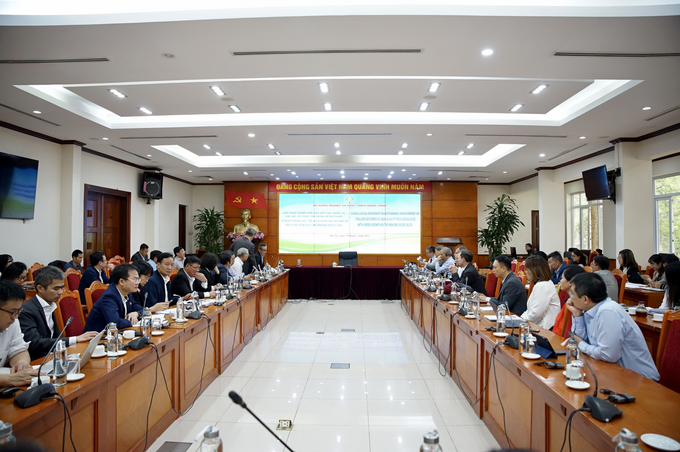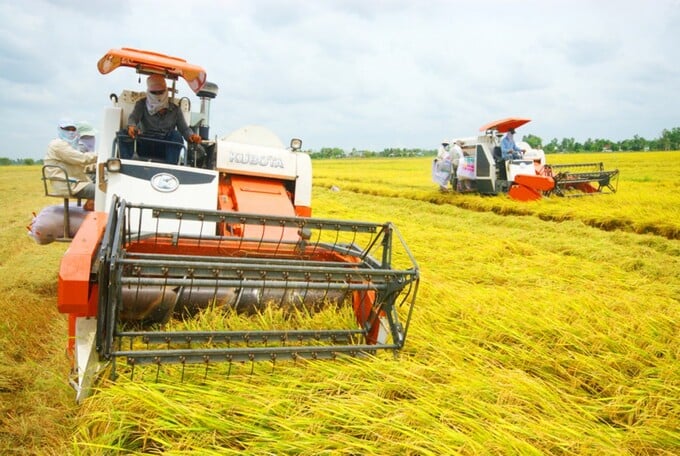June 21, 2025 | 03:40 GMT +7
June 21, 2025 | 03:40 GMT +7
Hotline: 0913.378.918
June 21, 2025 | 03:40 GMT +7
Hotline: 0913.378.918
On March 29, the Ministry of Agriculture and Rural Development hosted a consultation workshop on the long-term development of one million hectares of high-quality rice connected with green growth in the Mekong River Delta (or 1 million ha of high-quality rice project for short).

The Ministry of Agriculture and Rural Development would like to receive ideas from international partners on the overall content of the project and potential interventions in terms of policies, investments, and coordination mechanisms to implement the project.
Vu Thanh Liem, Deputy Director of MARD's Internation Cooperation Department, stated that the Mekong Delta has received several development projects and programs from international organizations. The Vietnam Sustainable Agriculture Transformation Project (VnSAT) is expected to be the foundation for the 1 million-ha high-grade rice project.
Guo Li, Senior Agriculture Economist at the World Bank's South Asia Region, underlined the importance of the private sector in all stages of the rice value chain, from production to processing to market access. Li advocated that the program clarify the value chain's diversity and the possibility to boost farmers' income.
The World Bank may assist Vietnam in terms of infrastructure in the scheme's implementation and speed up collaboration with MARD to determine the list of infrastructure needed in each location. Moreover, the World Bank can help to streamline carbon credit consultations while also assisting the Vietnamese government in transitioning to low-emission rice production and collecting carbon credits for sale.
"We are mobilizing around USD 40 million to launch the VnSAT follow-project (2026-2028) to support activities related to carbon credit; the project will begin with ricer areas applying the "1 must 3 reductions" process, System of Rice Intensification (SRI) or GAP," Li said, adding that the World Bank may include the project in the scheme with the official proposal from the Vietnamese Government.
The World Bank may potentially develop a 20 million USD grant program to assist Vietnamese private banks in implementing lending programs for farmers. After 2027, the agency will mobilize USD 60 million for a project aimed at building a carbon market in Vietnam.
"So, 120 million USD is the amount that the World Bank can support Vietnam in implementing the 1 million hectare rice program, and we hope to work together with the Ministry of Agriculture and Rural Development, banks, and sponsors to support this program with the common goal of building a high-quality, low-emission rice production area in the Mekong Delta," Guo explained.
In addition to financial assistance, officials from other international organizations such as the International Rice Research Institute (IRRI) and the Food and Agricultural Organization of the United Nations attended the workshop (FAO)... It was also recommended to assist scientific and technological solutions, particularly the development of a measurement-reporting-verification (MRV) system in specialized agricultural regions to quantify emission reductions, as a foundation for registration for low-carbon rice product certification.
Dr. Cao Thang Binh (World Bank senior agriculture expert in Vietnam) stated that the project must define how emissions reductions would contribute to Vietnam's NDC program. Furthermore, it is vital to define the capital solution, which stimulates private sector engagement through explicit channels and rules. It is also required to describe the system and policy for receiving money from climate funds, carbon funds, and rural funds, particularly the mechanism of carbon payment for reinvestment and producers.

International organizations proposed to support scientific and technological solutions, especially build a measurement-report- verification (MRV) system in specialized farming areas.
According to a representative of the Netherlands Development Organization (SNV), the organization has collaborated with the Department of Crop Production to implement the project "Transforming the rice value chain to respond to climate change and sustainable development in the Mekong Delta," which uses ODA capital worth USD 15 million as leverage to mobilize private sector investment in promoting rice production technology, reducing greenhouse gas emissions, and promoting sustainable development.
"According to the initial survey, enterprises in the Mekong Delta rice value chain committed to deploying 200,000-300,000 hectares of high-quality rice land; we hope that this project will be associated with the Project of 1 million hectares of rice," said a representative of SNV, emphasizing the importance of coordination and the use of ODA support.
Translated by Dieu Linh

(VAN) The waste of resources from agricultural by-products and the situation of counterfeit and poor quality goods in production causing losses of thousands of billions were pointed out by the National Assembly deputy.

(VAN) After 5 years of implementation, the CAI initiative has helped coffee growers change their farming practices, moving toward responsible agriculture that meets global export standards.

(VAN) The primary prerequisite for the comprehensive and robust integration of Vietnam's livestock sector into the global value chain is the establishment of a disease control system.

(VAN) The results of national programs are essential for establishing a contemporary livestock sector that is well-equipped to meet the demands of both domestic and international markets, with robust biosafety standards.

(VAN) The UNESCO Global Geopark revalidation of Non nuoc Cao Bang and the transition to a two-tier administrative model are presently undergoing a pivotal moment in Cao Bang, the northernmost province of Vietnam.
/2025/06/13/5330-2-004539_953.jpg)
(VAN) Changing policy mindset and removing investment barriers are urgent requirements to open up new development space for enterprises in the agricultural sector.

(VAN) The areas include the restoration of five million hectares of marine ecosystems.